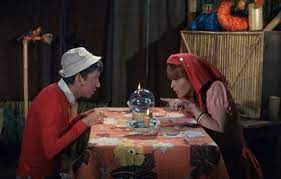Elections Are Decided By Those Who Don’t Vote
How do you decide whom to vote for?
I spent 25 years in politics chasing the answer to that question. And the answer is this:
You’ve already decided whom to vote for.
You’d like to pretend you haven’t. You’d like to say I’ve examined all the candidates, all the issues, the domestic needs, our foreign policy aims, the direction of science & technology, and consulted with my doctor, my lawyer, my preacher and my psychic. My mind is clear, my heart is pure and my diligence is due.

It says “Get Clean For Gene?”
The truth is, for politicos, we already know how you’re voting. We just check for your name on a number of different lists, check your voting record, and decide if you’re worth our time.
The “you” I’m speaking to is a member of a class of people that fit the “you” profile, and we can predict with pretty good accuracy whom you’re going to vote for – better than your psychic can, anyway – because we have large and growing amounts of data on everybody, and we can use data science to correlate what we know about groups of “you” with voting patterns.
This is not to say “demographics is destiny,” but rather to illustrate that the old models of elections no longer obtain: there is no vast pool of undecided patriotic Americans who can be persuaded to vote for your candidate by an objective comparison of positions, policies and personal probity.

Luke, Vote Palpatine …It is your Destiny
Rather, since the 70s, identity politics and mass media began to widen the gulf between the two parties. This was turbo-charged when Bill Clinton’s election drove home the fact that Reaganism was a brief blip. The sheer numbers were in the Democrats’ favor (we’ve won every popular vote after 1988 but one) so Newt Gingrich et al began a scorched earth policy to convince everyone that Democrats were evil.
But they weren’t trying to coerce people to switch parties or candidates. They were trying instead to anger and frighten their voters, so that they would come out in greater numbers against the less than white, less than honest, less than moral evil Dems.
That approach has a flip side, a key flip side I didn’t understand until after 2016. Getting out the vote (GOTV), i.e. trying to gin your voters up to touch that screen, darken that oval or punch that chad, is important, but at the same time you are also trying to ruin your opponent’s GOTV by depressing their voters to just do nothing.
This phenomenon is called Negative Partisanship. Your vote is no longer a positive step towards seeing your policy initiatives thrive (really, was it ever?) but rather a veto of the other side because of who they are and what they represent. Elections now turn on who stays home because their candidate is unpalatable, yet they’d never ever vote for the dark side.

Nooo, I’m Ridin’ with Mothma!
Negative partisanship is how we lost 2016. And why we won 2020 and why 2024 will be a Blue Tsunami.
Pay little attention to the few GOP folks who say they will vote for Biden. In 2024, the job is no longer to convince people he’s better than Trump: there’s no one convincible left. The job is to convince anti-Biden people to just stay home.
Demographics is just a road map. GOTV is destiny.
Primo, great points, superb writing and tantalizing optimism.
Remember “it’s the economy, stupid”? Good times. Since tRump the destroyer, it has been ‘it’s the stupid, stupid.’ Your optimism is my wish, Primo. Hoping 2024 is the election that finally demolishes the GOP forevuh.
1The division into right and left began with the Voting Rights Act in 1965. Before that, there were liberal Republicans (Jacob Javits) and conservative Democrats (James Eastland).
The biggest change I’ve noticed over the past 50 years was the mercifully brief activism of the Christian right. They tend not to vote (because their minds are not devoted to earthly concerns). For a while, Falwell stirred them up.
They have tended to retreat to their usual indifference, although the ability of the Democrats to rile them up again with absurd positions (what’s your pronoun?) has somewhat obscured this reversion to a mean.
2I usually end up voting for the one I’m LEAST against. Rarely in the 50+ years i’ve been voting was there someone I was actually for.
3Ah, yes. The disappearing quantity that we called “Persuadables”. Gone like the Flintstones.
4That’s why I think its funny that for the past 30 years, Presidential candidates pivot to the “sensible middle” with their campaigns, hoping to gain the votes of said “sensible middle”. Those voters had already made up their mind, when it was the base that the politicians forgot needed to get out.
5Primo, in my over 5 decades of voting, I,too, often voted for the least objectionable candidate. Today I’d say whoever is the least dangerous. I may have voted for a republican in those years, but could probably count the number of times with my middle fingers.
6Anyway, I certainly hope your comment “2024 will be a blue tsunami” comes true and we get rid of trumpf and his supporters and do something about the SCOTUS.
My line in the sand is abortion. If you don’t have the right to control your own body, nothing else matters.
7The data aggregators know everything there is to know about all of us. And discouraging people from voting is the new way to win. What gets me is that there seems to be nobody using social media to stop that chit. IDK about the rest of the world but there is no Democratic party in Texas. Howard Dean tried. I emailed Harris county Democratic party 2 times to be the precinct chair and never heard a word.
8I live in a little blue island surrounded by a sea of red counties…and we use the data to knock on doors and turn out the ‘seldom voters’. It works until the ratf**kers in the state capital gerrymander us out of existence, since they’ve gerrymandered themselves into nothing but safe seats….
9You’re spot on about Newt but omitted his sidekick an local “R” hero Tom DeLay who did the technical dirty work by gerrymandering Texas and other states to make it possible to turn competitive places into Republican strongholds.
10Give us an update on the guy.
Glad to read you again, Sr. Encarnacion
11